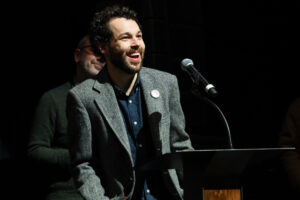Jerry Rothwell
Jerry Rothwell is a British documentary filmmaker. He joins Film Forward in Imperial Valley to screen and discuss his latest film Town of Runners.
The fence which runs along the U.S.-Mexico border stretches for some 600 miles. At Mexicali it takes the form of a new 20-foot-high iron barrier, the legacy of Bush’s war on drugs and increased homeland security after 2001. Occasionally the top of this fence is graced with an old piece of clothing—a torn jacket, a dusty shirt—caught on the rails and abandoned during attempts to scale it. Over time, the wind flaps these fragments of clothing to polish a neat circle of silver on the rust.
We’ve crossed this border several times in the last couple of days to screen Town of Runners and Stacey Peralta’s Bones Brigade: An Autobiography to schools and communities in the border area, with the Sundance Institute’s Film Forward programme. To get out of the US has been straightforward; to get in is another matter, with long queues and lots of questions, a daily experience for many Mexicali residents. The fence, of course, isn’t equally permeable from either side.
In Mexicali, the image of the fence suffuses the work of the students and artists who we’ve talked to and whose films we’ve watched and discussed. At UABC a short drama made, remarkably, in 72 hours by two students for a tourist board competition told the story of a mother and daughter separated by the divide.
In Mexicali Rose, the community arts base for young people in the area and our partners for the visit, even the experimental films seem to be about borders. My impression of Mexico is a place where walls always serve a dual purpose, defining a space, but also always covered with colourful messages, adverts, decorations, murals. Even on the new fence some inventive muralist use the triangle shape of the rails to create an op-art landscape that changed as you moved past it. That mural was quickly removed.
Living next to the fence shapes the towns on either side in different ways. Whilst California’s El Centro is on a sparsely populated plain, an end territory, on the Mexican side, the city of Mexicali has about a million inhabitants, many of whom have arrived in the town either in the hope of crossing the border or as a result of deportations from the US.
We’re told that deportation buses deposit a couple of hundred people in the town each night. The neighbourhoods close to the fence are full of rundown boarding houses, gangs that have grown up around the cross-border drugs trade, abandoned and burned out buildings squatted by displaced people, as well as dentistries and pharmacies benefitting from medical tourism for cheaper treatment than the US.
Some 30 miles south of Mexicali, we show both films outdoors to several hundred students at Cecyte Missiones School. Children in the school live mostly in the housing projects in the area, now squatted by people from all across Latin America who’ve arrived to cross the border, and ended up making their lives on this plain. I’m struck by the welcome we’re given.
There’s an overwhelming sense of hunger for this kind of visit – perhaps the feeling that their situation is invisible to the wider world and that our coming here feels like a rare recognition. In the Q&As, questions invariably include ‘Will you come and make a film here, about us?’ My response is to try and seed the idea that they could start making films about themselves – that they are the best people to tell their stories.
There are always a couple of kids in whom that spark begins to take light—maybe they don’t say it in the Q&A, but afterward they’ll come and ask how they might start making films. It’s exciting that there might be future filmmakers from this region whose filmmaking ambitions are seeded by these screenings.
Having filmmakers attend screenings here shows these children that films don’t just emerge full blown from a remote north. They’re made by people you can talk to and exchange ideas with (I’ve now got a bunch of young Facebook friends in the Mexicali suburbs) and it’s not so far-fetched that you could make films yourself.
The breadth of the Film Forward programme—with films from Ethiopia and Syria, New Orleans and Kashmir—perhaps also communicates to young people here that their own stories, however neglected, are important to tell. Mexicali Rose works with local young people through film, photography, visual art and radio, to do just that.
Set up in a house formerly used to traffic people across the border, it’s now become a hub for a different kind of traffic—exchanging art and ideas across the fence.







